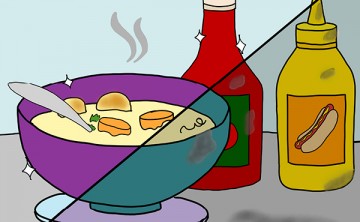 As students, we are often found littering cheap diners, fast food joints, pho parlours, pizza places and of course, the local pubs. We’ve been stuck in class all day and the process of picking up more groceries, then cooking those groceries, is too much to ask. So why not just grab a bite to eat somewhere? With such choice of fare, a bad experience at one restaurant can often leave you heading for greener pastures, but which food and beverage businesses should be avoided and which given another chance?
As students, we are often found littering cheap diners, fast food joints, pho parlours, pizza places and of course, the local pubs. We’ve been stuck in class all day and the process of picking up more groceries, then cooking those groceries, is too much to ask. So why not just grab a bite to eat somewhere? With such choice of fare, a bad experience at one restaurant can often leave you heading for greener pastures, but which food and beverage businesses should be avoided and which given another chance?
Places with dirty bathrooms: It’s way easier to clean a bathroom than it is a kitchen. So if the staff can’t keep a bathroom clean, the kitchen may be worse. This is when you pack up for greener pastures.
Cold food and slow service: The server left it too long under the heat lamp, and it’s either gone crusty, stale or cold. Before you write off this restaurant, stop and look around. Are most of the tables full? Are the wait staff rushing back and forth from the kitchen with panicked looks? There’s a good chance the kitchen just isn’t properly staffed for the number of patrons this visit. The hospitality industry has a very fluid stream of employees, so kitchens are frequently understaffed. I’ve worked on lots of those shifts; your food isn’t late for lack of trying. Send your food back, and they’ll fix it for you, but don’t judge the whole experience on that.
The Monday-night special: Whether it’s Chinese food buffets or simply a “chef’s” special, Monday’s food is often the weekend’s leftovers rehashed. The chef makes the weekend specials; the rookie cook/local high school student makes the Monday night special. On this night, I’d stick to the menu.
Servers spend more time cleaning their nails than talking to customers: I’m sure they’re charming people, but they don’t care what happens to your food.
Hair in your food: Finding a hair in your food can be disturbing for most people, but much of the time, it’s your own hair. People never want to hear that, but it’s true. Kitchen staff are required to wear hairnets or hats if their hair grows past their ears, so the likelihood of one loose hair slipping through is slim. Of course, if you see kitchen staff without a hat or a hairnet, that’s another great sign that the restaurant should be avoided!
Dirty shakers and condiment bottles: The salt and pepper shakers and any condiments on the table should be well cleaned just as often as the table. If you see grimy shakers, it’s a sign of careless staff.
Menus over five pages: No restaurant has the capacity to carefully prepare a five-page menu of fresh food. This tells you the kitchen is probably working from frozen goods. You might as well get some frozen food at your local grocery store, because at least this way you know how clean the kitchen is and you’re not just paying someone to press the reheat button. There are two ways to warm frozen food — nuke it, or fry it. So with five pages of different frozen offerings, that microwave is a war zone, and that fryer’s oil is blacker than tar.
Disgruntled servers: This is a grey area. Some people enjoy the whole experience of dining out, and bad service can taint that. If it really bothered you, talk to the manager, but remember one important thing: if the service sucked but the food was good, make sure you tip at least five per cent. The kitchen usually gets tips too, and the average amount for them is five per cent. They may survive off tips just like the waiters do, so don’t leave them high and dry.







